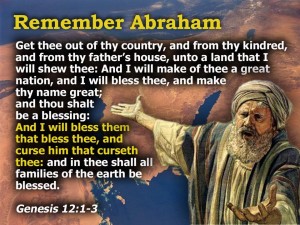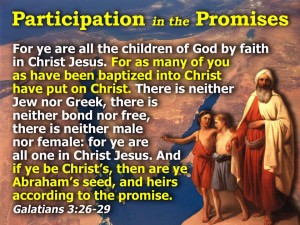The conflict between the two seeds (Genesis 3:15), seen first of all in the religious difference between Abel and Cain, continued. In time, there was intermarriage between the sons of God and those who were of “man”, ie of the ideology of Cain, crossing the “enmity” which God had placed between the two ideologies. As a result of men leaving the ways of God, wickedness and violence increased, which resulted in the flood. Genesis 6:2,3,5
Noah was saved, because:
- He was just and upright
- He walked with God (Genesis 6:8,9)
After the flood, the earth was repopulated. But problems developed again, and people left serving God to do “things their way” … Men departing from God’s way built cities and developed empires (Babel, Genesis 11:9; 10:10), seeking to “ make us a name” (Gen 11:6). God thwarted their purpose by confounding their language. He decided to work through one man (Abraham), one family, and ultimately one nation, to bring about His purpose.
Abraham is VERY important in the purpose of God. God tells us what He thinks of him in Genesis 18:19. He was a man who had the capacity to “keep the way of the Lord” and pass it on. Abraham is mentioned 74 times in the New Testament.
The promises made to him form the basis of the Gospel. (It is not possible to understand the gospel without Abraham).
Abraham is described as:
| The friend of God | James 2:23 |
| Father of the Jews | Romans 4:12 |
| Father of us all | Romans 4:16 |
| Heir of the world | Romans 4:13 |
The Call of Abraham
Genesis 11:27-32 Abraham lived in a sophisticated civilisation. “Ur of the Chaldees” was a city of culture and learning, also a centre of idolatrous worship (Joshua 24:2-3). The temple or ziggurat of Ur is one of the best preserved ancient monuments in Iraq today, (Tell al-Muqqyyar). Abraham received a message from God to leave. This is recorded in Acts 7:2. He and his family moved to Haran – 800 miles north-west.
In Haran, Abraham is again called to leave. (Genesis 12:1-3) The story demonstrates two types of people:
- Those who remained in Ur and Haran (idolatrous)
- Those who, because of God’s Word, are prepared to separate from their former life
1 PROMISE TO ABRAHAM

Genesis 12:1-3, 6
|
(a) A great nation (b) A great name (c) Bless them that bless thee (d) ALL be blessed |
NATIONAL (Israel) PERSONAL FAMILY INTERNATIONAL |
These promises remain unfulfilled (Hebrews 11:13). Though a wealthy man, Abraham continued to live in tents as a mark of his pilgrimage. He did not endeavour to “put down his roots” as it were, because “he looked for a city .. whose builder and maker is God”. (Hebrews 11:10) Abraham, like others who are recorded in Hebrews 11, will receive the promise in the future (Hebrews 11:39,40).
The seven words of the international promise (“In thee shall all nations be blessed”) constitute the gospel : Galatians 3:8. They show that God intended ultimately to bring blessings to ALL PEOPLES. In Genesis 13:14-17, the LAND is promised to Abraham.
2 COVENANT
Genesis 15:18-21 – the boundaries of the land are defined. God makes a covenant (more sure than a promise).
Abraham and Sarah have the promised son, Isaac, in their old age. They face the supreme test when God commands Abraham to sacrifice Isaac. (Abraham believed in the resurrection – Hebrews 11:19.)
3 OATH
Genesis 22:16-18 – Promises and covenants are conditional. This time, God guarantees the promises – on the basis of His own existence.
Hebrews 6:13-18 states that the promise is now “immutable” – unchangeable.
“thy seed” is no longer the nation of Israel – the singular pronoun “his” defines the seed as singular. Paul interprets this as Christ. Galatians 3:16.
Note:
Promise – requires action on part of person to whom promise is made
Covenant – A contractual agreement between two parties
Oath – A declaration of an absolute guarantee, which is irrevocable
Abraham’s Descendants:
Many of the natural descendants of Abraham have returned to the land, in preparation for the final stage of the fulfilment of the Promise. “God has not cast away his people whom he foreknew” (Romans 11:1)
Jesus Christ, through his death, made the Promise to Abraham effective for all who wished to “join the family of Abraham”. This can be done by baptism into Christ. Galatians 3:27-29
At the return of Jesus, Abraham will be resurrected, restored to the land, and truly “his name will then be great”. Luke 13:28, 29
HOW THE NEW TESTAMENT INTERPRETS THE PROMISE TO ABRAHAM

1. Mary believes that Jesus is born as a result of the promise to Abraham (Luke 1:54,55)
2. Jesus taught that Abraham “saw” the day of Christ and looked forward to it. (John 8:58)
3. True descendants of Abraham are characterised not by genealogy but by personal qualities (John 8:39; Romans 4:12)
4. The Promise to Abraham IS THE GOSPEL (Galatians 3:8)
5. Abraham is “heir of the world”! (Romans 4:13)
6. Abraham will be in the Kingdom of God. (Luke 13:28)
7. Jesus Christ died “that the blessing of Abraham might come on the Gentiles through faith” (Galatians 3:14)
8. There is only one way we can inherit – we must belong to the family of Abraham, THROUGH BAPTISM INTO CHRIST. (Galatians 3:27-29).
9. In Christ, we are related to the covenants of promise and the commonwealth of Israel (Ephesians 2:12,13)
Next Lesson: The Establishment of the Kingdom of God – how God chose the small nation of Israel to live under His laws.




